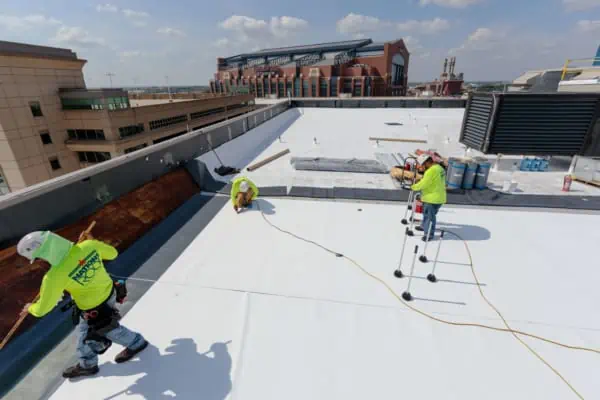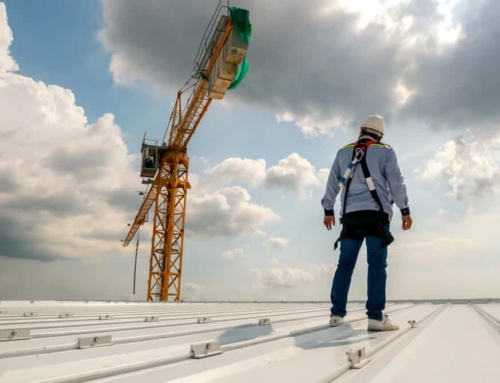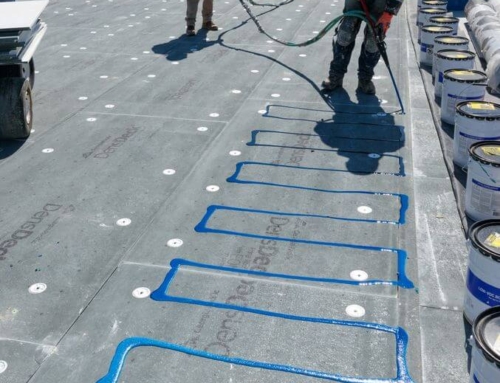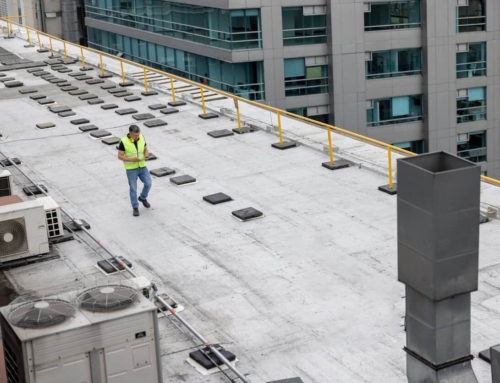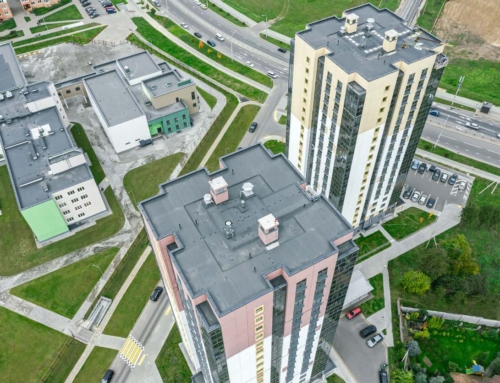Your best source of information on roofing systems is always your certified commercial roofing contractor. But first, keep reading for a quick discussion of TPO vs. modified bitumen roofs.
Contents
Differences Between TPO and Modified Bitumen Roofing Systems
Both TPO and modified bitumen are popular roofing systems for commercial buildings. However, they are very different from each other. Here are the significant differences between each system.
- TPO (Thermoplastic Polyolefin) is a single-ply roofing system that comes in sheets. However, the modified bitumen roof system is a modern version of BUR roofs (or built-up roofing systems), a multi-layer system.
- TPO material has been used on commercial roofs since the 1990s, while the modified bitumen system is much older, as it was developed in the early 1970s.
- Modified bitumen systems are applied to a substrate using cold process adhesives, hot asphalt, or torches. TPO is typically fully adhered with bonding adhesive or mechanically attached.
- Both TPO and modified bitumen roofing membranes are manufactured with a layer of reinforcement.
- TPO membranes are heat welded at the seams to create a watertight surface. Only experienced commercial roofing contractors should install TPO and modified bitumen systems – if you want your commercial roof to last.
Pros and Cons of TPO Systems
TPO systems are surging in popularity. Here are the reasons:
- TPO offers a lot of flexibility in colder temperatures.
- TPO membranes come in a variety of colors, with the most popular options being white, gray, and tan.
- TPO roofing systems are very popular in warmer climates because the surface offers excellent resistance to UV rays.
- Besides reflecting nearly 87 percent of UV rays away from a roof, the system is resistant to environmental pollutants and chemicals.
- Some TPO membranes are Energy Star-rated and Cool Roof Rating Council-approved.
- TPO can be applied to existing roofing materials.
- TPO roof may last 20-30 years if properly installed and maintained.
There are disadvantages to using TPO systems instead of modified bitumen systems, including:
- Since TPO is a single-ply membrane, problems occur when the surface is punctured. There is no hard layer to shield the surface from dropped tools, heavy foot traffic, and falling limbs.
- Problems can occur when TPO roof systems aren’t expertly installed. For example, gaps can occur if the industrial roofer doesn’t take great care in welding the seams.
Pros and Cons of Modified Bitumen Systems
Modified bitumen roofing systems were created when a polymer was added to the asphalt of a BUR system. This additive increased the flexibility of the asphalt and extended the roof’s lifespan, which was seen as a significant improvement to traditional asphalt roofs.
There are two types of modified bitumen:
Styrene Butadiene Styrene (SBS) is a rubber-like polymer that is most commonly installed using cold adhesive or hot moppings of asphalt. Atactic Polypropylene (APP) is a plastic-like polymer that is usually heat-welded or torch-applied.
The benefits of modified bitumen include the following:
- Modified bitumen roofing can withstand both high and low temperatures.
- Modified bitumen roofing systems offer greater thickness and redundancy to protect the asset of your building.
- A modified bitumen system can withstand foot traffic compared with other roofing materials.
- Reflective granules and coatings are available to achieve a more reflective surface.
- When properly installed and maintained, a modified bitumen system can last up to 20 years.
Even though modified bitumen systems have longevity in the industry, there are disadvantages:
- Modified bitumen systems do not stand up well to pooling water.
- Leaks are hard to detect in modified bitumen roofing systems.
The Roofing Experts at Nations Roof Will Help You Decide
Your experienced roofing contractor at Nations Roof will help you decide between TPO, modified bitumen, or other commercial roofing systems. We have been the country’s full-service commercial roofing contractor for almost two decades, and our crews have experience with all types of roofs.
Contact Nations Roof today to schedule a consultation or a 21-point inspection on your roof.
Key Takeaways About TPO and Modified Bitumen
- TPO is a single-ply roofing system and a newer roofing option than modified bitumen systems.
- Modified bitumen roofing systems are multi-layered.
- TPO stands up well against UV rays, but modified bitumen roofing systems are better for high-traffic roofs.
- Seek the advice of a certified commercial roofing contractor to choose TPO vs. modified bitumen for your commercial building.


